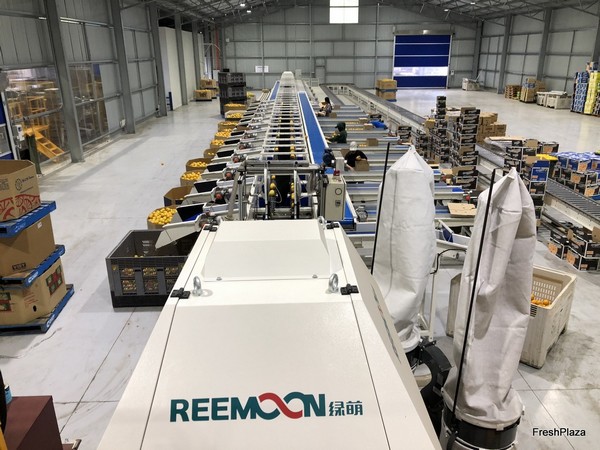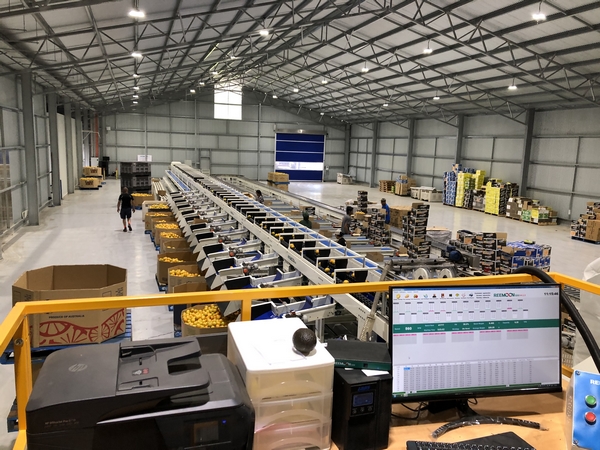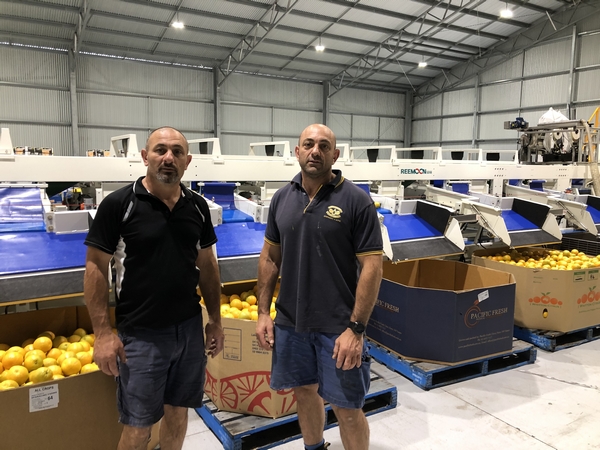 发布时间:
2020-12-31
发布时间:
2020-12-31
 访问量:11147
访问量:11147




他说:“我们从1973年开始运营,现在已经进入第三代。” “我们从最初占地65英亩的果园开始,现在我们在中央海岸和(新南威尔士州)里维纳纳地区里顿的300英亩土地上种植。40%的产量是橙子,40%的柠檬,鳄梨和20%的鳄梨,虽然我们正在种植更多的鳄梨,但鳄梨和柠檬都在中央海岸,这里有橘子和橘子等特色品种,例如位于里顿的Dekopon。Sparacino Farms - Reemoon Fruit Sorting Machine
COVID-19 has provided many challenges for fresh produce companies in 2020, but one Australian avocado and citrus producer has self-installed its new fruit sorting machine over a video call.
Sparacino Farms, on the New South Wales Central Coast, this year set up the Reemoon technology systems in the company's packing shed. Due to travel restrictions, the Chinese company was unable to access the site to provide assistance so it was all done remotely.
"For the installation process we basically had eight containers delivered," co-owner Alf Sparacino said. "Along with my brother (Joe), and one of my sons we all pretty put it together ourselves. We then had a team of electricians come in and wire it all up. It was very different. Reemoon's support has been really good also. There is a bit of a language barrier, but their support has been awesome. We have spent some long days over the internet and video calls, but we are really happy with their support. It's just out of everyone's hands with what has happened with COVID-19."
The company's previous grader was 20 years old and the new technology is starting to provide some major benefits, especially with the blemish and colour sorting system.
"With citrus, we are getting 95 per cent accuracy," he said. "So, we are very happy with it. We did colour and blemish on our old system, but with the new system, we have probably doubled our production. We can probably put 10 tonnes (of fruit) an hour though, which is what we are comfortable doing."
There is still some fine-tuning, which will need an on-site engineer to visit from China when the borders finally open up and allow for business travel, once again.
"The avocado grading still needs some adjustment," Mr Sparacino said. "The images that they see over the internet are different from what you see live. They basically need to come out and go through the system as well. But their support has been amazing. The importance of blemish grading is that we can do multiple grades. If we are hand-sorting, you are limited as to how many grades you can do. The programs that I have set up on our computer, some of them have 5-6 grades, and 3-4 different colours. What you can do with that sorting system is endless."
Photo: Joe and Alf Sparacino
Reemoon was established in 2001 and has systems that cater to many areas of post-harvest, including quality, visual, weight, colour, density and defect sorting.
"Joe went over to Asia Fruit Logistica, and met Reemoon," Mr Sparacino said. "They have visited us on a few occasions, and we went to China and we were happy with what we saw. We thought their system was as good or better than anyone else's, and the price is much better."
June to January is the peak time for the business, but this year the crop was a little smaller than previous years, due to the drought that has impacted the state over the past two years.
Another reason for the upgrade of the grader is that Sparacino Farms is expected to double its production in coming two seasons, with over 300 acres of orchard.
"We've been operating since 1973 and are now in our third generation," he said. "We start with this original orchard of 65 acres, now we are farming over 300 acres here on the Central Coast and in Leeton in the Riverina region (of NSW). 40 per cent (of production) is oranges, 40 per cent lemons, and 20 per cent avocados. We are planting more avocados though. Avocados and lemons are here on the Central Coast, with oranges and speciality mandarin varieties, such as Dekopon down in Leeton."
下一篇:易磕碰水果分选:如何避免受伤


